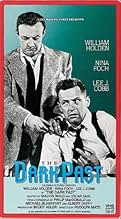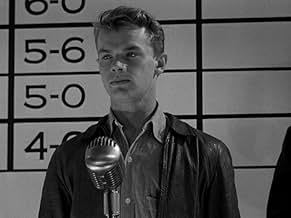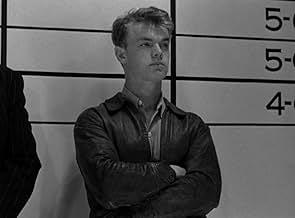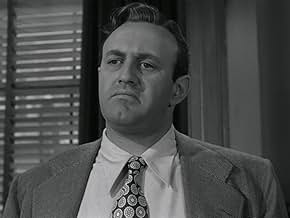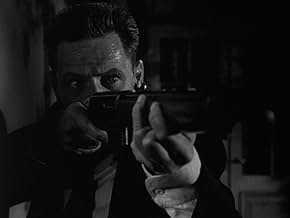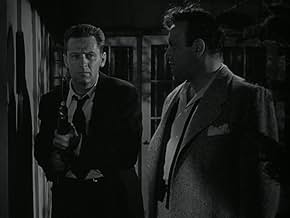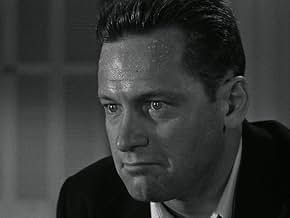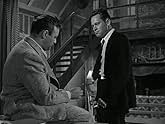AVALIAÇÃO DA IMDb
6,3/10
2,4 mil
SUA AVALIAÇÃO
Um psicopata fugitivo que leva a família e os vizinhos do psicólogo policial como refém revela um pesadelo recorrente para o médico.Um psicopata fugitivo que leva a família e os vizinhos do psicólogo policial como refém revela um pesadelo recorrente para o médico.Um psicopata fugitivo que leva a família e os vizinhos do psicólogo policial como refém revela um pesadelo recorrente para o médico.
- Direção
- Roteiristas
- Artistas
- Prêmios
- 2 vitórias no total
Charles Cane
- Sheriff
- (não creditado)
Bill Cartledge
- Arrested Man Leaving Wagon
- (não creditado)
Tom Coleman
- Detective
- (não creditado)
G. Pat Collins
- Al's Father
- (não creditado)
Ellen Corby
- Agnes
- (não creditado)
Lester Dorr
- First Man in Police Line-Up
- (não creditado)
Edward Earle
- McCoy
- (não creditado)
Avaliações em destaque
Preachy story explaining why juveniles turn to crime because of the failure of the system.
Lee J.Cobb is a crime psychologist with a conscience, who is taken prisoner at his weekend retreat by notorious bad boy Al Walker ( William Holden ). While Cobb's guests are guarded by Walker's accomplices, the two form an uneasy truce. This results in Cobb analysing Walker's recurring nightmare, which frees him from his torment and exorcises his vendetta against society. His crimes are traced back to his childhood and lack of parental guidance. The 'message' is conveniently simplistic for the less demanding viewer - society helps create criminals in the way that young offenders are treated by the authorities, and that criminal behaviour in some cases should be treated as an illness not a crime.
While few would dispute there is some truth in this, the film thrusts this idea clumsily and implausibly. 'The Dark Past' is basically dull. Totally forgettable were it not for the presence of the two leads who acquit themselves adequately with the poor material.
Lee J.Cobb is a crime psychologist with a conscience, who is taken prisoner at his weekend retreat by notorious bad boy Al Walker ( William Holden ). While Cobb's guests are guarded by Walker's accomplices, the two form an uneasy truce. This results in Cobb analysing Walker's recurring nightmare, which frees him from his torment and exorcises his vendetta against society. His crimes are traced back to his childhood and lack of parental guidance. The 'message' is conveniently simplistic for the less demanding viewer - society helps create criminals in the way that young offenders are treated by the authorities, and that criminal behaviour in some cases should be treated as an illness not a crime.
While few would dispute there is some truth in this, the film thrusts this idea clumsily and implausibly. 'The Dark Past' is basically dull. Totally forgettable were it not for the presence of the two leads who acquit themselves adequately with the poor material.
The return of variously shell-shocked, amnesiac or otherwise afflicted soldiers from the front precipitated a spate of postwar movies purporting to delve into the mysteries of the human psyche. In most cases, psychology was presented either as a sinister black art (to be viewed with the utmost suspicion) or in a laughingly simplistic way. The Dark Past, grindingly earnest, opts for the latter path. Wrong'un William Holden, visibly chafing under the constraints of the script, invades a home and holds its occupants -- family and guests -- hostage. He has the bad luck to find among them psychoanalyist Lee J. Cobb, puffing away at the inevitable pipe, who turns the ordeal into a teaching opportunity. Slowly he breaks down Holden's wall of defenses, until a childhood memory emerges....This Freudian breakthrough, of course, occurs in record time, though for viewers it may seem like a big chunk of eternity. Mercifully, Adele Jergens sashays in and out a few times to lower the picture's tone to tolerable. The Dark Past is a period-piece, of some interest to fans of the noir cycle, but its stagey insights and dated dramaturgy have not aged gracefully.
The Dark Past may very well have been a turning point in the career of William Holden. As you remember Holden had a dual contract with Columbia and Paramount and I'm sure Billy Wilder at Paramount must have seen The Dark Past before casting Holden in Sunset Boulevard. This B film for Columbia was unlike any of the 'smiling jim' roles that Holden had played up to now.
The Dark Past has only a 75 minute running time and was playing the bottom end of Columbia double bills when it first came out. It's a remake of another Columbia film Dark Past with Chester Morris in Holden's part as the escaped killer. The part of the psychiatrist played by Lee J. Cobb here was played by Ralph Bellamy in the previous production.
Cobb is now a police psychiatrist, but wasn't always; in fact as he relates in flashback he was a professor when he ran into Holden who was escaping from jail with his mob and his moll. They take refuge in Cobb's summer house where Cobb and family are entertaining guests.
Lee is as cool as he would be emerging from a refrigerator. He starts getting under Holden's skin with his training exposing the real cause of his killer personality. Most disarming in every sense of the word.
If it were only that easy. Still the film in its short run does keep one in suspense. A lot like the duel of minds between Humphrey Bogart and Fredric March in The Desperate Hours. Also look for a very good performance by Nina Foch as Holden's moll who unwittingly leads to her man's downfall when she asks Cobb to find out about a recurrent nightmare Holden has.
If a dose of Freud could only cure all bad behavior.
The Dark Past has only a 75 minute running time and was playing the bottom end of Columbia double bills when it first came out. It's a remake of another Columbia film Dark Past with Chester Morris in Holden's part as the escaped killer. The part of the psychiatrist played by Lee J. Cobb here was played by Ralph Bellamy in the previous production.
Cobb is now a police psychiatrist, but wasn't always; in fact as he relates in flashback he was a professor when he ran into Holden who was escaping from jail with his mob and his moll. They take refuge in Cobb's summer house where Cobb and family are entertaining guests.
Lee is as cool as he would be emerging from a refrigerator. He starts getting under Holden's skin with his training exposing the real cause of his killer personality. Most disarming in every sense of the word.
If it were only that easy. Still the film in its short run does keep one in suspense. A lot like the duel of minds between Humphrey Bogart and Fredric March in The Desperate Hours. Also look for a very good performance by Nina Foch as Holden's moll who unwittingly leads to her man's downfall when she asks Cobb to find out about a recurrent nightmare Holden has.
If a dose of Freud could only cure all bad behavior.
On a night I couldn't sleep, I came across this movie on the TV set by chance. The house of a psychiatrist is held hostage by an escaped prisoner and his entourage. The prisoner (william holden) battles his mental demons throughout the night while the psychiatrist is intrigued to discover why this man has become the "bad egg" he is today. The dialogue between them both is intriguing, with the psychiatrist trying to enter the escaped prisoner's mind and explain the dream this man has had since childhood. A good movie to watch on a rainy day. One particularly for the crime/noir buffs.
"The Dark Past" is a remake of the 1939 picture "Blind Alley" which starred Chester Morris and Ralph Bellamy. In this newer version, William Holden and Lee J. Cobb play these roles.
The film begins with a prison break. Al Walker (Holden) is the leader of the band of thugs and he murders the Warden (who they've taken hostage) just for kicks. He decides the gang will NOT hold up in one of the empty vacation homes nearby but one with people in it. This way, he figures, the cops won't suspect where they are hiding. The home happens to be filled with quite a few people, as Dr. Collins and his family are hosting a dinner party. Soon, all of them are prisoners and hoping that the gang doesn't kill them. As for Dr. Collins, he is a psychiatrist and plays a mental game of cat and mouse with Walker.
In many ways, this film is reminiscent of "Suddenly" and "The Desperate Hours"---both films about families being held hostage by killers. All of these are very good films and what sets this film apart is the psychiatrist angle. I enjoyed the film, though as a trained psychotherapist I should point out that Dr. Collins' approach is very Freudian...and rarely used today by therapists. Dream interpretation and mother blaming are rarely discussed in therapy today. And, folks like Walker are NOT cured so quickly and easily!! Ridiculous, sure...but still entertaining.
While I rarely say this, I think this film is actually a bit better than the original. Much of this is due to William Holden's more realistic and less sensationalistic performance.
The film begins with a prison break. Al Walker (Holden) is the leader of the band of thugs and he murders the Warden (who they've taken hostage) just for kicks. He decides the gang will NOT hold up in one of the empty vacation homes nearby but one with people in it. This way, he figures, the cops won't suspect where they are hiding. The home happens to be filled with quite a few people, as Dr. Collins and his family are hosting a dinner party. Soon, all of them are prisoners and hoping that the gang doesn't kill them. As for Dr. Collins, he is a psychiatrist and plays a mental game of cat and mouse with Walker.
In many ways, this film is reminiscent of "Suddenly" and "The Desperate Hours"---both films about families being held hostage by killers. All of these are very good films and what sets this film apart is the psychiatrist angle. I enjoyed the film, though as a trained psychotherapist I should point out that Dr. Collins' approach is very Freudian...and rarely used today by therapists. Dream interpretation and mother blaming are rarely discussed in therapy today. And, folks like Walker are NOT cured so quickly and easily!! Ridiculous, sure...but still entertaining.
While I rarely say this, I think this film is actually a bit better than the original. Much of this is due to William Holden's more realistic and less sensationalistic performance.
Você sabia?
- CuriosidadesThe re-creation of Al's dream uses a few seconds of footage from Alucinação (1939), the earlier film version of this story; specifically the shot approaching the saloon, panning to see the policemen following the narrator, and panning back to the saloon side entrance.
- Erros de gravaçãoAl takes a book off of Andrew's book shelf and opens it around page 50 or 60, but in the next closeup, the page Al is looking at the start of Chapter 22. It's highly unlikely that a scholarly book about psychology would average under three pages per chapter.
- ConexõesReferenced in Discovering Film: William Holden (2015)
Principais escolhas
Faça login para avaliar e ver a lista de recomendações personalizadas
- How long is The Dark Past?Fornecido pela Alexa
Detalhes
- Tempo de duração
- 1 h 13 min(73 min)
- Cor
- Proporção
- 1.37 : 1
Contribua para esta página
Sugerir uma alteração ou adicionar conteúdo ausente

